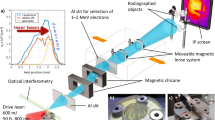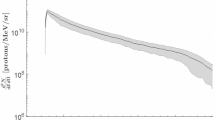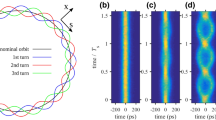Abstract
WE take this opportunity of replying to the criticisms expressed in Prof. Stahel's letter printed above. Prof. Stahel has investigated1 the β-particle emission of radium-D, using a point counter as was first accomplished by Riehl.2 Through a collodion window of 0.8 mm. air equivalent thickness 0.83 particles per disintegration were registered. Stahel maintains that all these particles were photoelectrons produced by the known γ-ray of 47.2 ekv. energy. He bases this contention (a) on Petrová's3 interpretation of a range distribution constructed from Wilson chamber observations, and (b) upon certain control experiments made upon the absorption in the counter window in his own researches.1
This is a preview of subscription content, access via your institution
Access options
Subscribe to this journal
Receive 51 print issues and online access
$199.00 per year
only $3.90 per issue
Buy this article
- Purchase on SpringerLink
- Instant access to full article PDF
Prices may be subject to local taxes which are calculated during checkout
Similar content being viewed by others
References
Z. Phys., 68, 1; 1931.
Z. Phys., 46, 478; 1927.
Z. Phys., 55, 628; 1929.
Proc. Camb. Phil. Soc., 25, 522; 1929.
Proc. Roy. Soc., A, 104, 192; 1923.
C. R. Acad. Sci., 180, 1257; 1925.
Phil. Mag., 2, 1109; 1926.
Proc. Roy. Soc., A, 130, 310; 1931.
Naturwiss., 14, 1199; 1926.
Author information
Authors and Affiliations
Rights and permissions
About this article
Cite this article
FEATHER, N., RICHARDSON, H. Beta-Rays of Radium-D. Nature 129, 314–315 (1932). https://doi.org/10.1038/129314b0
Published:
Issue date:
DOI: https://doi.org/10.1038/129314b0



